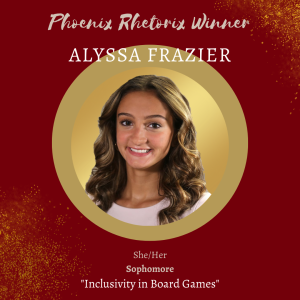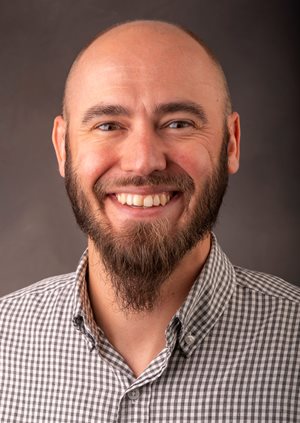Inclusivity in Board Games by Alyssa Frazier
Inclusivity in Board Games
A Magazine Article by Alyssa Frazier
Click the fullscreen “x” icon below to read Alyssa’s article
Author Interview – Alyssa Frazier
Q: Please introduce yourself! What is your preferred name, pronouns, and majors/minors?
A: My name is Alyssa Frazier (she/her) and I am from New Jersey. I am a sophomore at Elon and still undeclared. I am thinking about double-majoring in Biology and either Human Service Studies or Psychology. I am an Isabella Cannon Leadership Fellow, so I also have a minor in Leadership Studies as part of the program.
Q: What inspired you to write about board games?
A: Board games have a way of bringing different people together. For me, playing board games was a way for my family to come together and create memories. Board games also played an integral role in cultivating relationships with family members. I still always play board games with my family and friends. My favorite board game is Clue, which was the topic of my first project in ENG 1100. While conducting research for that project, I stumbled across an article discussing how Clue had been re-released many times to become more inclusive. It made me wonder how many other games had also evolved for the same reason, which inevitably led me to the topic of my soon-to-be published piece: inclusivity in board games.
Q: How do you see your piece contributing to Elon’s ongoing conversations regarding diversity, equity, and inclusion?
A: My piece focuses on the importance of diversity, equity, and inclusion in board games. It discusses the shortcomings of popular board game companies and the ways in which they have and are currently working towards creating inclusive games. Board games should reflect the culture outside of the board game and represent those playing them. Since many board game players are children, it is even more crucial for our society to fight for DEI in board games. Board games contribute to child development and when children do not see themselves within them, their self-identity construction is affected. Aside from representation, I hope my piece sparks more conversations on advocating for the inclusion of persons with visual impairments.
Q: What writing and/or research skills did you develop in your ENG 1100 class?
A: The main skill I acquired in this class was how to write with intention and purpose. Dr. Maynard stressed the importance of writing for a particular audience, which helped me better cultivate and tailor pieces to appeal to a specific group of people. My ENG 1100 also developed my research skills. Since my topic is so niche, it was extremely difficult to find legitimate sources to support my argument…The research process was definitely difficult. However, it taught me many strategies about conducting online research that I will implement in the future.
My biggest takeaway from my ENG 1100 class is that writing is a complex process. I learned that writing a piece is an ongoing process in which the writing is constantly revisited and revised.
Q: What advice would you give to students who are currently enrolled in ENG 1100, might want to complete a similar project, or are interested in publishing in Phoenix Rhetorix?
A: The biggest advice I would give to ENG 1100 students is to take advantage of your professor and classmates and integrate them into your writing process. Prior to this class, writing was a very individualistic process for me. Most of the papers I have completed during my school career have been written alone, without the assistance of peers or outside writing resources. However, after having meetings with Dr. Maynard and participating in daily peer editing in ENG 1100, I quickly realized that my writing process is much more efficient when I allow others to engage with my writing.
ENG1100 Faculty Interview – Travis Maynard
Q: During your ENG 1100 class, what about Alyssa’s piece stood out to you?
A: I was really struck by two different things about Alyssa’s project. First the subject material itself: I really enjoy playing board games, but I’d never quite considered the potential lack of diversity and accessibility the medium has, so I was fascinated to learn more about how companies are addressing those issues. Second, I was really impressed with Alyssa’s sense of design, especially for a first-year student. The magazine spread came together so well, and I think that it does really well to target the specific audience of educators, encouraging teachers to incorporate more inclusive board games into the classroom.
Q: How did this piece evolve as Alyssa completed this course assignment?
A: This piece actually emerged from an infographic Alyssa designed earlier in the semester about the evolution of a single board game, clue. Once we dove into the research phase of the semester, Alyssa broadened her scope to focus more on board games as a whole, which led to her focus on inclusivity in the medium.
Q: Did Alyssa face any particular challenges with this assignment? If so, how did you help them navigate those challenges, and/or how did they work to overcome them?
A: As I recall, the biggest challenge was figuring out how to expand her research from the board game Clue to something that could incorporate academic scholarly sources. Since board games are a relatively niche topic, we weren’t entirely sure if Alyssa would be able to find the academic resources that she needed. But once we did find the sources, everything else fell into place in terms of choosing an audience that would be invested in the material and choosing a genre that would be appropriate for that audience.
Q: What was the most rewarding part of working with Alyssa on this project?
A: I really appreciated the commitment and care that Alyssa brought to the project. It is always incredibly rewarding when students show passion for their topics, and rely on that passion to make wise rhetorical decisions about how to share their knowledge with the world.
Q: What advice would you give to students who are currently enrolled in ENG 1100, might want to complete a similar project, or are interested in publishing in Phoenix Rhetorix?
A: In ENG 1100, rely on your peers and professor for feedback as much as you can. Test audiences like those really help you see if your projects are accomplishing what you want them to accomplish. Relying on that feedback and really, truly devoting time to revision will result in a much stronger final product.
More specifically, if you’re wanting to do a visual design project like a magazine, don’t feel like you have to start completely from scratch. Find visual texts in the same genre that you like; then, imitate them, remix them, and make them your own!